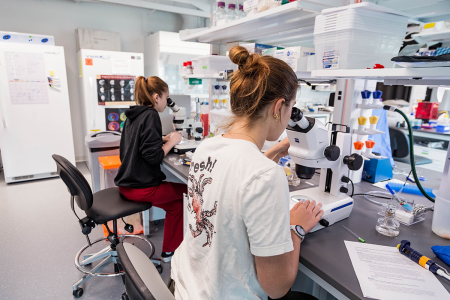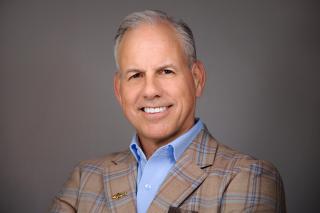In January 2024, Dr. Paul Geisler, formerly Professor of Health Professions Education, Associate Dean of Health Sciences, and Interim Associate Dean of Natural and Behavioral Sciences, accepted a new position as Interim Dean of the School of Sciences and Health Professions. He will become the official Dean following the School’s formal renaming on July 1, 2024.
“It’s a little surreal, as I just came to Simmons less than three years ago. But I’m excited and thrilled,” remarks Dr. Paul Geisler on his recent promotion to Interim Dean of the School of Sciences and Health Professions. “After receiving the offer just before the Holiday break, I spent much of the winter break brainstorming what I will do as Dean of a new School.”
Hired at Simmons in July of 2021 as Associate Dean of Health Sciences and Professor of Health Professions Education, Geisler’s compressed and collective administrative experiences at Simmons helped prepare him for his new responsibilities. As Associate Dean of Health Sciences, he was responsible for leading four graduate-level programs.
Just six months into this appointment, Geisler became the Interim Associate Dean of Natural and Behavioral Sciences (NBS). “I had big shoes to fill at NBS, but I quickly decided to take it on for numerous reasons. There I became more familiar with the procedures and policies of our undergraduate programs, in addition to the graduate ones. I also developed a heightened awareness of Simmons’ unique women-centered approach. Serendipitously, then, I feel prepared for my new role as dean of a much larger School, one that will include public health, mathematical, natural and life sciences, behavioral and psychological sciences, and health sciences (except Nursing).”
Challenges and opportunities
Geisler assumes this role during an era of much change at the University. “It’s not just Simmons in particular that is being challenged, but higher education in general. I believe that a combination of challenge and opportunity effects change. . . But as the reorganization [i.e., recalibration of Simmons’ schools, departments, and major offerings] began to crystallize, I realized there was an opportunity for me to lead the new school into the future and to collaboratively meet the many intersecting needs of our faculty, students, staff and the University.”
As Dean of the new School of Sciences and Health Professions, Geisler will oversee several key changes. “The first thing we already accomplished together was to rename the School. We comprise a diverse array of academic disciplines, including Exercise Science, Public Health, Behavioral Analysis, Nutrition, and so forth. [Nursing will constitute a separate School.] There is tremendous opportunity here, and I see ways for us to leverage our uniqueness in order to redefine ourselves strategically and collaboratively.”
From a strategic standpoint, Geisler is focused on “getting Simmons on the map” vis-à-vis the greater science community. “We have a very complex and unique School, but not everyone in the STEMM industry [the second M refers to medicine and health sciences] is aware of Simmons’ stellar commitment to scientific research and literacy. Here we are in Boston, the biomedical capital of the country — or the world. The key industries need to know us better.”
Spotlight on STEMM at Simmons

Geisler plans to spotlight Simmons as a great place to study STEMM. “We have amazing faculty and facilities and a $112 million science center renovation of LeFavour Hall. We conduct phenomenal student driven research here, and we nurture STEMM students who identify as women or non-binary. Last year, approximately 40% of our STEMM majors were people of color or underrepresented minorities. The composition of the School will help magnify the message that we are the only undergraduate institution in Boston that focuses exclusively on women and underrepresented racial and gender minorities studying STEMM.”
Along these lines, Geisler will assemble a task force to review and reconceptualize STEMM education. “Our tagline is: ‘we deliver more than just a degree.’ In other words, we are taking a good look at the industry and society, and what people trained in science need today for personal and professional success and advancement. For instance, they need to know about AI, cybersecurity, wet and dry science, datasets and data management, environmental science, and so forth. Composed of faculty from all of our related academic programs, this task force will help us re-envision STEMM education at Simmons by 2025.”
Moreover, Geisler will guide the health professions to “align with best practices of health education and adaptive expertise. We aim to produce clinicians who are capable and competent, and we need to be in line with best-practices and emerging evidence in medical and health professions education in order to differentiate ourselves from our competitors and meet the demands of today’s healthcare workforce.”
Another priority is to integrate Simmons’ two Public Health programs (Bachelor’s of Science in Public Health and Master’s of Public Health) into the new School. “They are uniquely focused on social justice, but there are many avenues for dialogue and interdisciplinary collaboration here. If you look at social justice in healthcare practice, it includes such broad ranging considerations relative to the social and political determinants of health. At Simmons, a majority of the faculty and student research that comes out of our science labs is related to medicine and healthcare in some fashion — some directly linked to our environmental location and access to healthy living. Academia is famous for its silos, but our model invites cross-disciplinary collaboration that will benefit students interested in addressing such inequities and policies that preclude access to equitable healthcare.”
A more general, longer-term goal for Geisler is to address and improve faculty and staff retention and wellbeing. “I am a believer in ‘culture eats strategy for breakfast.’ As I understand, most Americans leave their jobs because of culture, or lack thereof, which has been disrupted further due to the pandemic. As dean, I wish to reestablish a culture of social academia that is collegial, interactive, supportive and sustainable.”
Team-based leadership
Regarding his leadership style, Geisler considers himself a “distributive, democratic, and collaborative leader. Also, I try to embrace epistemic humility: I know what I know, and know what I don’t know. I embrace changes that will make a positive impact, but I do not institute unnecessary change.”
Geisler’s team-based approach to leading mirrors his early passion for athletics and team-based sports. Growing up in Lakeville, Massachusetts, he played baseball and basketball, and consulted an orthopedist after badly spraining his ankle — introducing him to the world of sports medicine. Around this time, he attended a college fair and interacted with a representative from Marietta College in Ohio. When Geisler read their brochure, he was intrigued by the Sports Medicine major and eventually matriculated into Marietta’s program. After graduation, Geisler worked as an athletic trainer, in which he assessed, treated, and rehabilitated high school, professional, college, and Olympic athletes, and also obtained a master’s degree in Exercise Physiology from the University of North Carolina at Chapel Hill.
Geisler entered academia in 1998 when Georgia Southern University asked him to lead and develop their Athletic Training (AT) program. While there, he also obtained a doctorate in Education in 2004. In 2006, he arrived at Ithaca College to direct its renowned AT program and became a tenured professor. “I am incredibly proud of the team I led at Ithaca College, as together we made it into the top 5 AT programs in the country. I am also honored to have received the Sayers ‘Bud’ Miller Distinguished Educator Award [named after the first Chair of the National Athletic Trainers’ Association] in 2021, a lifetime achievement award within my discipline.”
As he looks forward to his new deanship, Geisler reflects on the rewarding trajectory of this career. “Whether I am treating a patient, teaching a student, or leading a team, I want to do everything I can to help people achieve their aspirations and become the people they want to be. With athletes, I love to witness their resilience as they get back on the field after a long injury and rehabilitation process. With students, it is a profound pleasure to observe their intellectual maturation and personal development towards their goals and dreams. Likewise, as a dean, I want to be an agent of change concerning the professionalization and advancement of our students and community. . . I believe that we are always in a state of becoming, and it is that process of ‘becoming’ that I gain the greatest joy and feel the greatest responsibility for cultivating.”
Geisler envisions the new School as a place of transformation. “Our top priority is to transform young, enthusiastic people into adaptive, free-thinking, mature beings. Because we are a student-centered and teaching-first University, our students will graduate with an excellent education and amazing, authentic research and practical experience. When they leave Simmons, they are going to be rock stars.”

